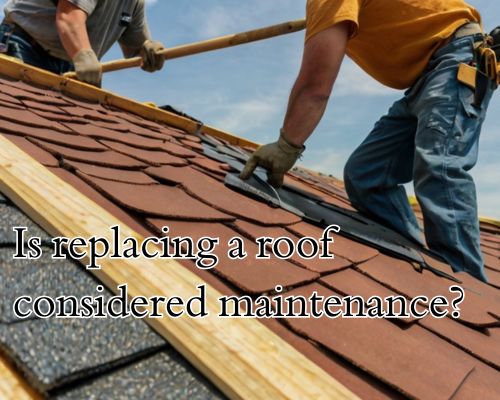When it comes to homeownership in New Jersey, one of the most significant investments you’ll make is in your roof. The question often arises: Is replacing a roof considered maintenance? Understanding the difference between regular maintenance, repairs, and full roof replacement can impact your property value, insurance claims, and budgeting. With CJ Commercial Roofing NJ, let’s break it down and explore the key considerations for homeowners in the Garden State.

Understanding Roof Maintenance vs. Roof Replacement
What Is Roof Maintenance?
Roof maintenance refers to routine tasks that prolong the lifespan of a roof and prevent minor issues from escalating. In New Jersey, where homes endure harsh winters, heavy rainfall, and occasional hurricanes, roof maintenance is essential. Typical roof maintenance includes:
- Inspecting for missing or damaged shingles
- Cleaning gutters and downspouts
- Checking for leaks or water damage
- Removing moss, algae, and debris
- Sealing minor cracks in flashing
Regular roof maintenance can add years to the lifespan of your roof and help avoid expensive repairs or premature replacement.
What Is Roof Replacement?
Roof replacement involves removing the existing roofing materials and installing a completely new system. Unlike maintenance, which preserves and extends the current roof’s life, replacement is a major renovation. Homeowners in New Jersey may need a roof replacement due to:
- Age of the roof (typically 20-30 years for asphalt shingles)
- Severe storm damage
- Persistent leaks despite repeated repairs
- Sagging or structural concerns
- Local building code requirements
While maintenance is considered a proactive measure, replacement is a reactive one, often necessary when repairs are no longer sufficient.
Is Roof Replacement Considered Maintenance?
Legally and functionally, roof replacement is not considered maintenance. Maintenance is an ongoing process that involves minor fixes to keep a system functional, whereas replacement is a capital improvement that increases home value. This distinction is important for tax purposes, insurance coverage, and homeowner association (HOA) regulations in New Jersey.
How Insurance Companies View Roof Replacement
Many homeowners assume their insurance policy will cover roof replacement. However, New Jersey insurers typically distinguish between maintenance-related wear and tear and damage caused by sudden events like storms.
- Covered by insurance: Roof damage from hail, hurricanes, fallen trees, or fire.
- Not covered by insurance: Gradual deterioration, improper maintenance, or old age.
To avoid unexpected out-of-pocket costs, homeowners should regularly document roof conditions and perform necessary maintenance.
Tax Implications: Is Roof Replacement Deductible?
For tax purposes, roof replacement is generally considered a capital improvement rather than maintenance. This means:
- Homeowners cannot deduct the cost of a roof replacement as an expense.
- However, it can increase your home’s adjusted cost basis, potentially reducing capital gains taxes when selling the property.
New Jersey homeowners should consult with a tax professional to maximize deductions and understand the financial impact of major home improvements.
When Should You Replace Your Roof in New Jersey?
Given the region’s climate, homeowners should proactively assess their roof’s condition. Key signs that replacement is necessary include:
- Multiple leaks – If leaks are widespread rather than isolated, a full replacement may be more cost-effective than repeated repairs.
- Curling or missing shingles – Harsh winters and Nor’easters can accelerate shingle wear.
- Mold or moisture damage – The humid summers in New Jersey can lead to algae growth and wood rot.
- Excessive granule loss – Shingles lose granules over time, but a significant loss can compromise protection against the elements.
- Roof age – If your asphalt roof is over 25 years old, it may be time to consider replacement.
Choosing the Right Roofing Contractor in New Jersey
If your home needs a roof replacement, choosing the right contractor is crucial. Look for licensed and insured roofing companies in New Jersey that offer:
- Experience with local weather conditions
- Transparent pricing and detailed estimates
- Warranty-backed workmanship
- Positive customer reviews and references
Trusted New Jersey roofing companies such as CJ Commercial Roofing NJ, Garden State Roofing, and Jersey Shore Exteriors have established reputations for quality service and reliability.
Final Thoughts: Maintenance vs. Replacement
While routine maintenance can extend the life of your roof, there comes a time when replacement is the best option. In New Jersey, where homes are exposed to extreme weather conditions, delaying necessary roof replacement can lead to costly structural damage.
If you’re unsure whether your roof needs maintenance or full replacement, consult with a professional roofer for an inspection. By staying proactive, you can protect your investment and ensure your home remains safe, secure, and weather-resistant for years to come.